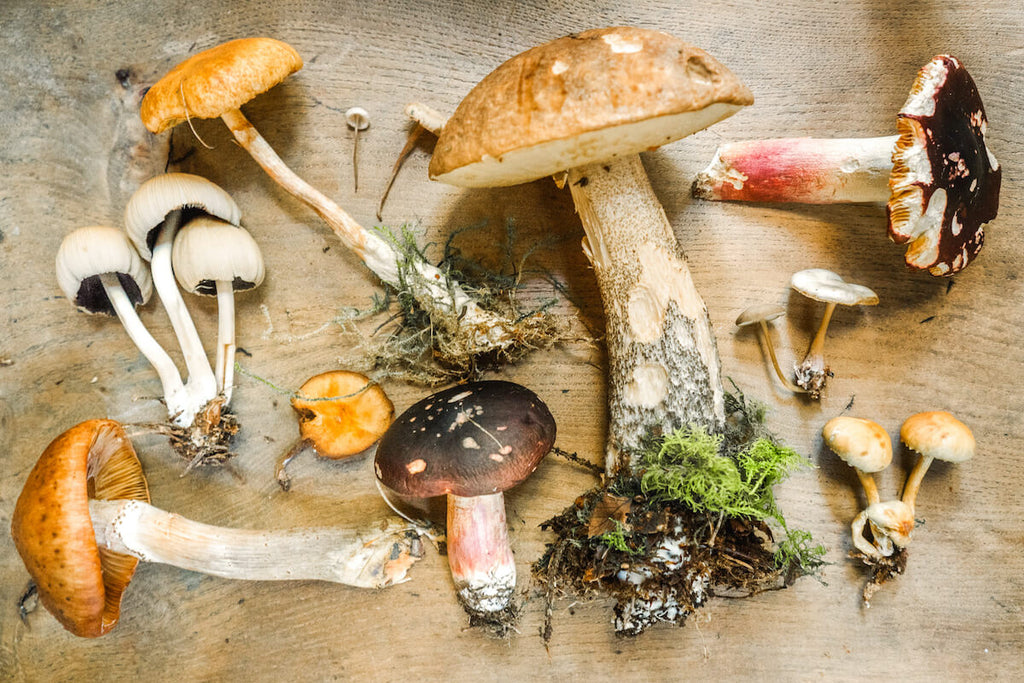‘Superfood’ is a term that’s been thrown around the wellness world with careless ease for some time now. From açai to chia, spirulina to blueberries, it often feels as if we’re being constantly inundated with information about what to eat, how much, and when.
Furthermore, lots of these popular and celebrated ‘superfoods’ can also be expensive, leading many people to think that they simply can’t get access to them in their diets. Recently, however, a new and unexpected ‘superfood’ was added to the list. You probably have them in your fridge already. Mushrooms, a superfood which won't cost you the Earth.
That’s right. Those furry brown things that you have with your full English on the weekend. In 2019, Jude Wilson, a biologist at MBio, told Euronews that mushrooms are actually “the superfood of the future”. Don’t believe us? Let us convince you.
What actually are mushrooms?

Put simply, mushrooms are the fruiting bodies of different species of fungi, making them neither a fruit nor vegetable.
Typically living in soil or wood, fungi produce spores (as a plant produces pollen or seeds), and these spores are able to spread and be carried by the wind. There are a huge amount of different types of mushrooms some of which are edible, and others which aren’t. Some non-edible mushrooms can even cause extreme illness.
Mushrooms have been used for culinary and medicinal purposes for centuries (magic mushrooms, anyone?). Chinese medicinal texts dating back to as early as 206 BC even talk about reishi mushrooms as having anti-aging properties.
However, increased research into their functional properties has caused a spike in the consumption of mushrooms for their health benefits in recent years.
Mushrooms: the health benefits
Mushrooms might not be the obvious choice when thinking about superfoods, because let’s face it, they’re beige and they look pretty weird. They may lack the visual beauty and colour of other nutrient-rich foods, but within those magical fungal caps lie a vast range of wonderful health benefits including antioxidant, antibacterial and immune stimulating properties, which can do your body and mind a world of good.
What’s more, an estimated 50% of edible mushrooms are considered ‘functional foods’, which means that they provide you with positive health benefits that go way beyond basic nutrition.
For example, mushrooms contain beta-glucans, which are dietary fibres (polysaccharides) strongly linked to improving cholesterol levels, boosting heart health, and increasing your immune defence.
The different types of mushrooms out there
Many mushrooms, such as reishi and maitake, also contain a multitude of antioxidants, such as L-ergothioneine, Selenium, Vitamin C, Vitamin A, beta-carotene. All of these can help reverse the negative health effects of free radicals - unstable atoms that can cause damage to cells and lead to illnesses and ageing.
Other mushrooms, including cordyceps, lion’s mane and reishi, are highly adaptogenic. This means they successfully help the body and mind to adapt to stress and fight fatigue through hormone regulation and stabilisation of the central nervous system.
Are mushrooms an effective superfood? The science...
Described as the 'medicines of the future', research into potential superfoods is increasing year-on-year as the scientific community amongst us work to find more and more natural alternatives to medicine. As a result, research into mushrooms and their potential superfood tendencies is no different.
One study, published in the International Journal of Medicinal Mushrooms (where else, of course), found that different kinds of mushrooms had varying antioxidant properties, with H. Erinaceus (aka, lion's mane mushroom) being a distinctly great source of these.
Further studies have also found that eating mushrooms may help to prevent respiratory infections, improve gut bacteria, provide gastrointestinal support, offer anti-inflammatory effects and even boost your mood.
How to get the most from your superfood mushrooms
If you’re liking the sound of making more room for mushrooms in your diet, here’s some tips for ensuring you’re buying the best of what’s on offer to you:
- Although textures vary, choose mushrooms that are firm, dry and unbruised.
- Avoid mushrooms that look wilted, wet or slimy or have a mouldy, musty smell.
- Once you buy them, store them in the fridge and don’t wash them until it’s time to cook. Keeping them in a plastic bag will make them sweat and go off more quickly.
How to cook your mushrooms
Now for the best bit: cooking and eating your mushrooms. Here’s some of our favourite tips and tricks.

- Mushrooms can be ruined by cooking them slowly over a lower heat. Get maximum flavour by cooking your mushrooms very quickly on a high heat.
- Sauté your mushrooms with onions and garlic for a side dish that packs a punch.
- Stuff portobello mushrooms with couscous and other vegetables for a delicious veggie option. Who needs meat anyway?
- Mushrooms and breakfast. A match made in heaven. Slice and add to omelettes and scrambled eggs, or grill instead for a slightly drier texture.
- Mushrooms taste great uncooked too. Chop or slice some raw mushrooms and add them to salads for a fresh, woody flavour.
Get even more from your mushrooms
If you aren’t the world’s most talented culinary genius, don’t panic. You don’t have to whip up a truffle mushroom risotto on the daily to ensure you’re getting all of the wonderful health benefits mushrooms have to offer. Innermost has you covered. Check out The Health Protein, our vegan protein blend, which contains shiitake, maitake, reishi and cordyceps, alongside a handful of other superfoods to support your immune system, improve wellbeing and encourage lean muscle development.
And if you’re feeling stressed or just need a little help drifting off at night, take a look at The Relax Capsules. Containing lion’s mane mushroom, these daily nootropic capsules have been formulated to promote relaxation, improve clarity and reduce stress.
Suggested reads
- Mesmerised by mushrooms? If you want to learn more, read this report about the role of edible mushrooms as functional foods. And let us know what you think of it. We'd love to hear you thoughts.


















